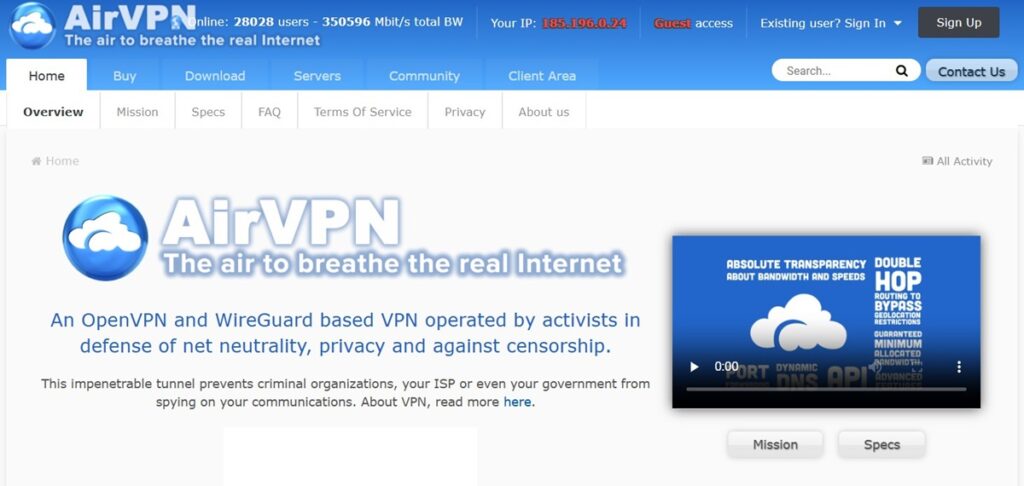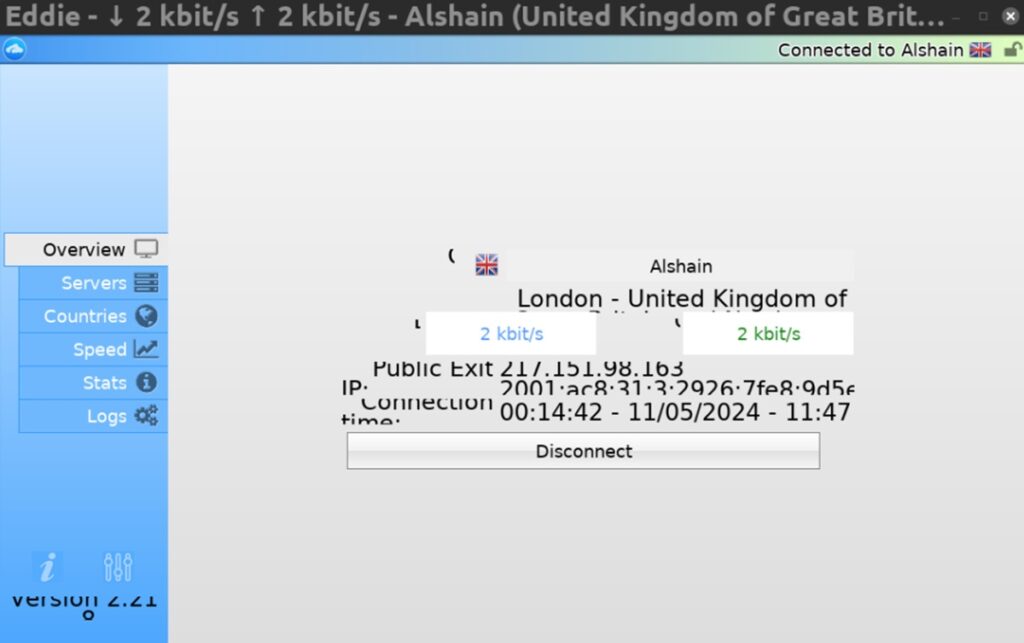When I first came across AirVPN, it felt like a breath of fresh air. No gimmicks, no marketing fluff. It was just a VPN built by privacy purists for privacy purists. If you value transparency, open-source software, and deep customization, there’s much to like here.
That said, it’s not for everyone. The interface feels dated, the setup can be confusing, and the streaming support is inconsistent. That’s where alternatives come in. I’ve tested dozens of VPNs and will include some of my top picks to provide some choices.
Table of Contents
- Quick Summary: Is AirVPN Worth It?
- What Is AirVPN?
- AirVPN Assessment: Key Highlights
- Use Cases: Who Should Get AirVPN?
- Best AirVPN Alternatives
- Feature Comparison: AirVPN vs Alternatives
- Final Thoughts

1. Quick Summary: Is AirVPN Worth It?
| Category | Rating | Notes |
| Privacy & Security | ⭐⭐⭐⭐⭐ | One of the best. No logs, open-source, advanced features. |
| Speed & Performance | ⭐⭐⭐⭐ | Solid, but speeds vary more than top-tier VPNs. |
| Streaming Support | ⭐⭐ | Unreliable. Often blocked by Netflix and others. |
| Ease of Use | ⭐⭐ | Designed for power users. Beginners may struggle. |
| Customer Support | ⭐⭐⭐ | Helpful forums, but no live chat or fast responses. |
| Value for Money | ⭐⭐⭐ | Fair pricing, but others offer more for less. |
If you care deeply about privacy, don’t mind tinkering, and aren’t focused on streaming, AirVPN delivers where it counts. It’s built by activists, backed by a passionate community, and loaded with advanced tools.
But it’s not the most polished VPN on the market, and for casual users, that can be a dealbreaker.
AirVPN is excellent if you know exactly what you’re doing and value transparency. But better choices are available for most people, especially those who want streaming, ease of use, or better speeds.
2. What Is AirVPN?

AirVPN is a privacy-focused VPN service started by digital rights activists and hackers. It was created to give users complete control over their internet connection and strongly emphasize transparency, freedom, and security.
a. A VPN Built for Privacy
Unlike most commercial VPNs, AirVPN doesn’t focus on flashy apps or big marketing. Instead, it puts privacy first. It uses only trusted open-source technologies like OpenVPN and gives you full access to advanced settings like port forwarding, SSH/SSL tunneling, and custom DNS.
b. Who’s Behind It?
The team behind AirVPN is deeply committed to internet freedom. The project started in 2010 during a conference on digital privacy, and it’s grown thanks to support from a loyal, tech-savvy user base. The service is based in Italy and managed by a company called Iridium.
c. Who Is It For?
AirVPN is best for users who care about privacy and want complete control. It’s ideal for torrenting, bypassing censorship, and setting up secure connections. But it’s not the easiest VPN to use.
3. AirVPN Assessment: Key Highlights
Pros
- Excellent Privacy Protections
- Open-Source and Transparent
- Advanced Features for Power Users
- Robust Torrenting Support
- Open Source Code
Cons
- Not User-Friendly
- Limited Streaming Access
- Small Server Network
- Dated, Buggy App
AirVPN may not have the polished look of mainstream VPNs, but it offers powerful features designed for users who value privacy, customization, and transparency. Here’s a breakdown of what it does best—and where it may fall short.
a. Strong Privacy and Security
AirVPN initially fielded the trusted and battle-tested OpenVPN protocol. However, it’s recently added support for WireGuard. The team believes OpenVPN is still the best choice for secure, reliable connections with complete transparency.
Other privacy features include:
- No-logs policy.
- Perfect Forward Secrecy.
- 256-bit AES encryption.
- Built-in support for SSL and SSH tunneling.
You also get features like Tor over VPN, adding another anonymity layer.
b. Open-Source Software
The AirVPN app “Eddie” is fully open-source and available on GitHub. This means anyone can inspect the code and check for vulnerabilities, which is rare in the VPN world. It earns significant points if you care about transparency.
c. Advanced Network Tools
One thing I appreciate about AirVPN is its advanced network features. You can:
- Set up port forwarding easily.
- Use custom DNS servers.
- Bypass deep packet inspection (DPI).
- Run VPN over SSL or SSH tunnels to disguise traffic.
d. Robust Torrenting
Torrenting works very well on AirVPN. All servers allow P2P traffic, and port forwarding makes it even faster. But streaming is another story. In my tests, Netflix, Hulu, and BBC iPlayer often failed to load or returned errors.
e. Poor User Quality Experience

The Eddie client is powerful—but it feels dated. If you’re unfamiliar with VPN terminology, the settings can be overwhelming. Mobile support exists, but it relies on third-party OpenVPN apps, which makes setup more complicated than most people want.
f. Limited Server Network
AirVPN has servers in about 20 countries, with a little over 200 servers total. That’s small compared to providers like NordVPN or ExpressVPN. But all servers are self-hosted and physically owned—not rented—so the tradeoff is higher trust, lower scale.
4. Use Cases: Who Should Get AirVPN?
AirVPN isn’t trying to be everything for everyone, which is part of its appeal. It’s a VPN made by privacy experts for people who want complete control over their connection. But depending on what you’re looking for, it could be either a perfect match or a frustrating experience.
Choose AirVPN If…
- You Prioritize Privacy Above All Else: It uses strong encryption, enforces a no-logs policy, and supports advanced features like VPN over Tor and SSL/SSH tunneling.
- You’re Comfortable With Technical Tools: You’ll get the most out of it if you know how VPN protocols work or don’t mind digging through settings.
- You Need a VPN for Torrenting: AirVPN is torrent-friendly across all servers and offers port forwarding.
5. Best AirVPN Alternatives
You’re not alone if you’ve made it this far and feel like AirVPN might be too complex, limited, or just not the right fit. While I respect what AirVPN stands for, I’ve tested many other VPNs that offer more flexibility, better speeds, and smoother user experiences.
Here are my top three alternatives to AirVPN, each offering a different value depending on your needs.
a. NordVPN – Best All-Around Pick
Whenever someone asks me for a VPN that balances speed, security, and ease of use, I recommend NordVPN first.
Why It’s Better Than AirVPN:
- Over 7,000 servers in 118 countries
- NordLynx protocol (WireGuard-based)
- Works with Netflix, Hulu, Disney+, and more
- Built-in ad and malware blocker
- Meshnet lets you create private networks
If you want something that “just works” with strong privacy behind the scenes, NordVPN is the safest bet.
b. Surfshark – Best for Tight Budgets
Surfshark offers many features at a price point that’s hard to beat, especially if you’re willing to commit to a long-term plan.
Why It’s Better Than AirVPN:
- Unlimited devices on one account
- Full support for streaming services
- WireGuard protocol for fast, stable connections
- CleanWeb blocks ads and trackers
- Very affordable
This is the one I usually recommend to friends or family who want strong protection without spending much.
c. ExpressVPN – Best for Streaming and Simplicity
ExpressVPN is fast, reliable, and incredibly easy to use. It costs more than most, but it’s often worth it for people who prioritize streaming or just want a smooth experience.
Why It’s Better Than AirVPN:
- Works flawlessly with Netflix, BBC iPlayer, Hulu, and more
- Lightway protocol for top-tier speed and performance
- Servers in 94 countries
- Sleek apps that are dead simple to use
- Known for excellent customer support and consistent reliability
If you’re less interested in fiddling with settings and more focused on smooth, secure access to content, ExpressVPN is the solution for you.
6. Feature Comparison Table: AirVPN vs Alternatives
I’ve used each of these VPNs extensively, and while they all offer strong security, their strengths vary depending on what you’re looking for.
This side-by-side table gives you a quick overview of how AirVPN compares to NordVPN, Surfshark, and ExpressVPN in the areas that matter most.
| Feature | AirVPN | NordVPN | Surfshark | ExpressVPN |
| Server Count | ~200 | 7,000+ | 3,200+ | 3,000+ |
| Server Locations | ~20 countries | 118 countries | 100+ countries | 94 countries |
| Streaming Access | Poor | Excellent | Excellent | Excellent |
| Torrent Support | Excellent | Excellent | Excellent | Excellent |
| Encryption | AES-256 | AES-256 | AES-256 | AES-256 |
| Ease of Use | Low | High | Very High | Very High |
| Logging Policy | No logs | No logs | No logs | No logs |
| Device Support | Limited | Excellent | Excellent | Excellent |
| Best Price | ~$3.50/month | ~$3.09/month | ~$1.99/month | ~$4.99/month |
7. Final Thoughts
AirVPN earns my respect. It sticks to its principles, doesn’t cut corners, and delivers on its promises of rock-solid privacy and powerful tools for advanced users.
If you want total control over your VPN setup, value open-source software, and don’t care much about a slick interface or streaming access, AirVPN is a solid choice. But for most people, it’s simply not the most practical option.
If you’re looking for a more effortless experience, better speeds, or a VPN that just works with Netflix, then you’re better off with a more versatile service.
Share this content: